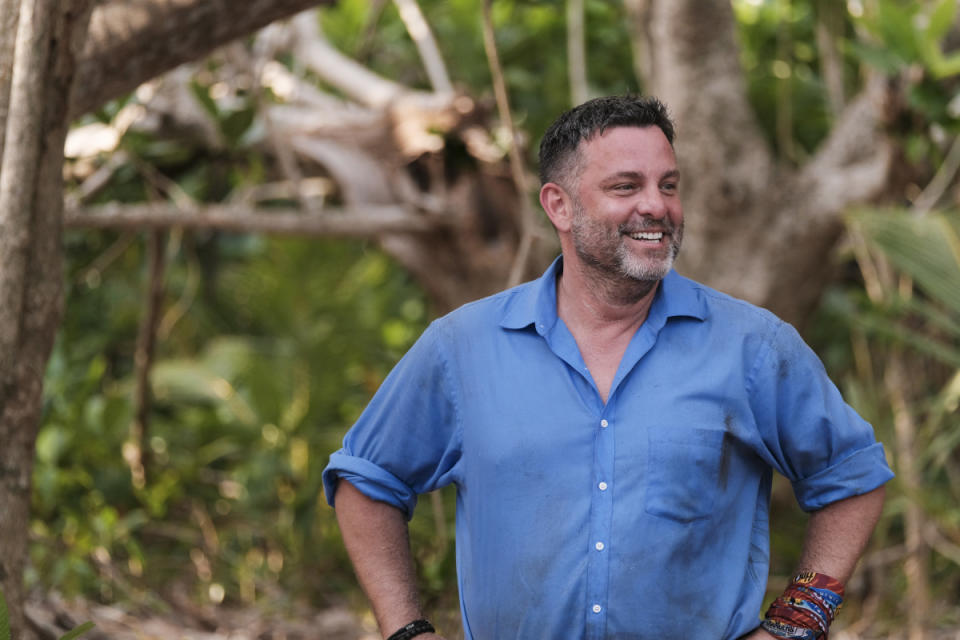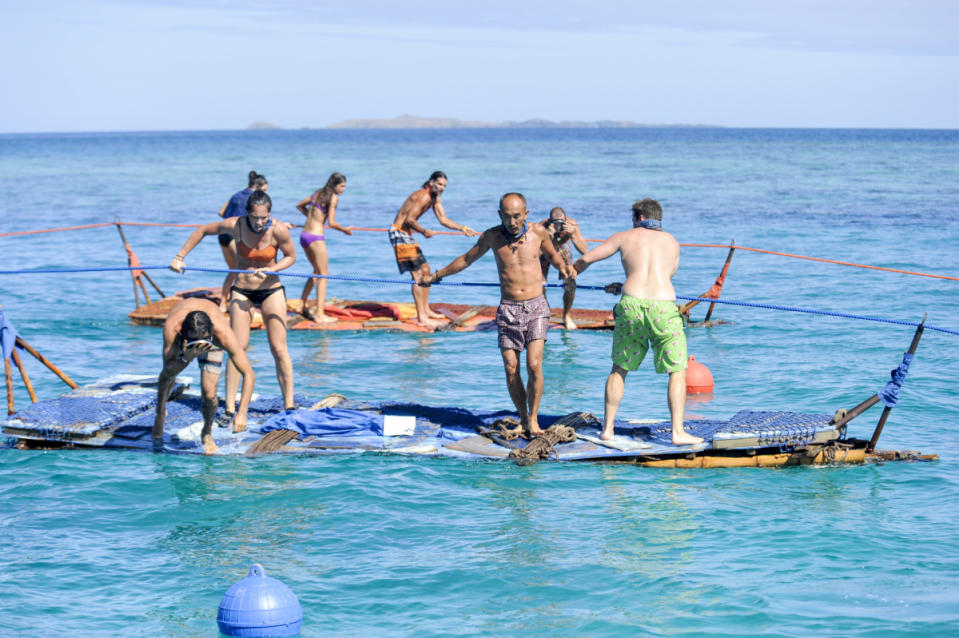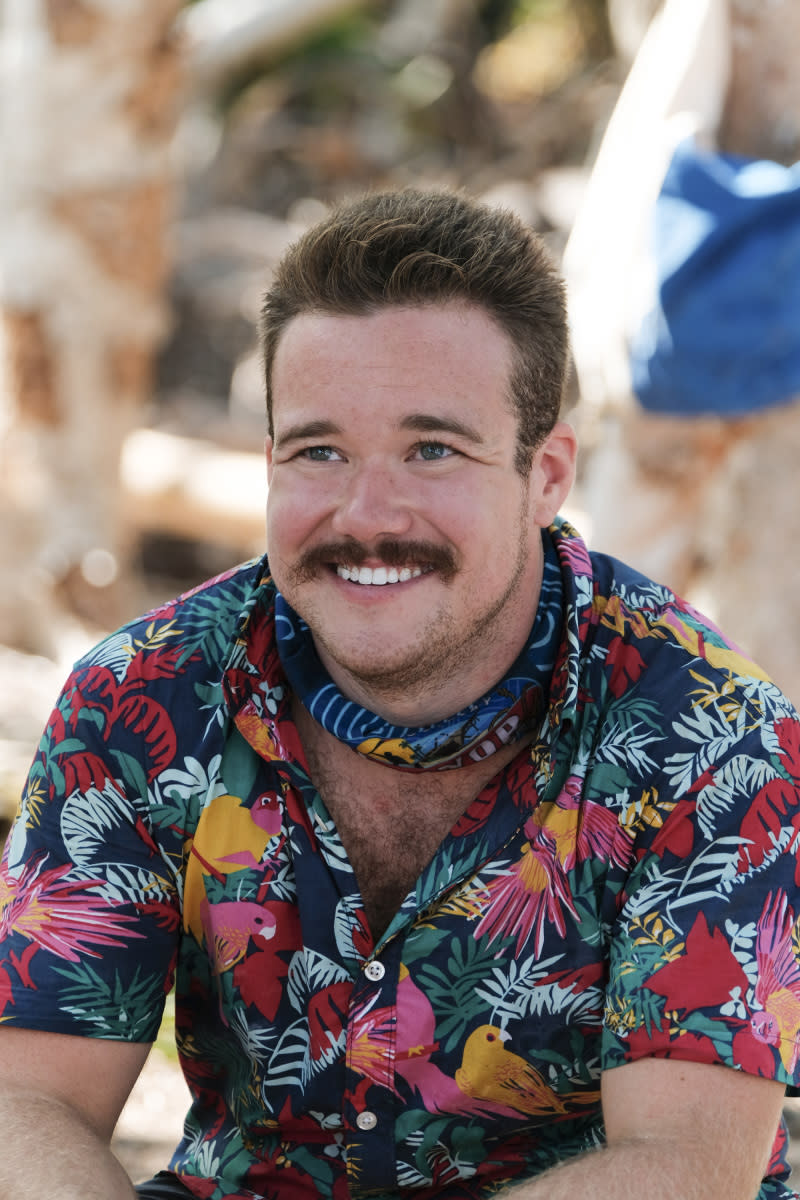‘Survivor: Game Changers’ Episode 7 Recap: Crossing a Line
Warning: This recap for the “What Happened on Exile, Stays on Exile” episode of Survivor: Game Changers contains spoilers.
Wednesday night’s episode of Survivor contained some very sensitive subject matter, and it’s too important to brush over in a standard recap. So just a warning, this recap won’t be focused on pizza rewards and gags about Debbie’s delusions. It’s a topic that requires some proper thought and context, and while as a straight white male I’m far from the most qualified to talk about these matters, I’m going to try.
For those who didn’t see the episode, at Tribal Council, Jeff Varner outed fellow contestant Zeke Smith as transgender. Not only did he out Zeke in front of the other tribemates, but in front of millions of viewers across America. His actions were met with such disgust and horror that he wasn’t even afforded the dignity of being voted out, he was essentially made to leave. It’s perhaps the most reprehensible moment in the show’s history, and there’s a lot to unravel.

Survivor‘s LGBT Past
Over the years, reality TV has played a significant role in altering the public perception of transgressive sexuality. The warts-and-all convention of the genre has allowed audiences a deeper look into the diverse representations of the LGBT community. While it would be a fallacy to say the portrayals have all been positive, the salient point is that the genre helped increase the visibility of queer sexuality on prime-time television.
Survivor itself contributed massively to the public discourse on sexual difference. Back in 2000, the N.Y. Post declared that “Survivor [had] dethroned Will & Grace as the funniest show on TV about homosexuality,” citing the odd-couple relationship between the openly gay corporate trainer Richard Hatch and 72-year-old Navy vet Rudy Boesch. The cunning and deceitful Hatch would go on to win the first season with over 50 million Americans watching at home.
Peter Nardi, a former president of the Gay & Lesbian Alliance Against Defamation, said that Hatch’s involvement in Survivor marked significant changes in television. “What strikes me about Survivor is that the talk about Richard has been about his personality — not the fact that he is gay,” Nardi said, contrasting Hatch’s multifaceted depiction to a former Real World contestant whose entire identity on the show was simply “the gay character.” Survivor had broken new ground when it came to the portrayal of LGBT people on TV.

Jeff Varner Arrives
It was shortly after Hatch’s victory, at the height of Survivor‘s popularity, that Jeff Varner, the man at the center of tonight’s drama, appeared in the show’s second season. While sexuality was just one part of the conversation in Season 1, it became a big focus in the fan community during The Australian Outback — despite the season featuring no openly gay contestants (at least not referenced on screen). However, the absence of “the gay character” only ignited speculation from fans about who was the “Richard Hatch” of the season. Jeff, the snarky Internet projects manager, was one of the players at the forefront of that conjecture.
Jeff never broached the subject of his sexuality on screen. In fact, last week’s episode was the first reference to him being gay over his three Survivor appearances. “There’s a lot of people in my life that don’t know I’m gay; they are learning that right now,” he said in a bonus confessional. Jeff never defined himself by his sexuality nor did he need to, yet in Season 2, people almost felt like they had a right to know. He was even put on the spot on The Howard Stern Show, asked directly by Stern himself, “Are you gay?” But we need only look at Jeff’s cagey answer to understand the complications of asking someone such a question in such a public forum. It was cringeworthy, awkward, and possibly even dangerous.
Regardless of how far we’ve come concerning LGBT rights, it’s a community that is still stigmatized and maligned in certain sections of society — including North Carolina (Jeff’s home). We live in a world where gay and transgendered people are still beaten and murdered at an alarmingly frequent rate. So when you “out” someone on any terms but their own you are committing a reckless act of insensitivity. You’re ripping away their protection and throwing them in front of potential hatred and discrimination. There is no telling the damaging consequences it could have on that person’s life, their family, friends, relationships, jobs, etc. It’s what makes Jeff’s actions in this episode so much more complicated, confusing, and ultimately, wrong.

What Would You Do for a Million Dollars?
So why did Jeff do what he did? Jeff’s mouth has certainly gotten him into trouble before (“We’ve got a rat!”), but he’s never shown malicious intent. He’s always been a compelling Survivor character, a wonderful narrator who peppers his confessionals with wit and humor. Yes, sometimes he can be a little crazed and erratic, but he’s never been hurtful. I’ve always enjoyed watching Jeff, and I have no doubt he deeply regrets what he did, but that does not excuse the fact that he did it.
The expression “desperate times call for desperate measures” springs to mind when considering his shameful actions at Tribal Council. Jeff has never made the jury phase of the game during his time playing Survivor, and after being swapped last week and losing his closest ally, Sandra, his life in the game was in a precarious position. He was willing to do and say absolutely anything that he thought would help him survive three more days.
But it’s difficult to comprehend just what was going through his mind when he decided to make this “move.” Did he suddenly expect everyone to see Zeke as a liar and boot him out? When a distraught Andrea asked what his goal was, Jeff explained it was “to show the deception. It reveals the ability to deceive.” There is no earthly way to defend that. It’s an utterly invidious act that feeds into every negative stereotype of trans people — that they shouldn’t be trusted and have ulterior motives.
Former Survivor winner Boston Rob once asked rhetorically, “What would you do for a million dollars?” Survivor is definitely not a shining beacon of humanity and togetherness; players lie, cheat, manipulate, and backstab all in the name of capital gain. However, those elements are built into the construct of the game — outwit, outplay, outlast. When you sign up to play Survivor, you understand that you’ll be lied to at some point. But you don’t expect to have your personal life exposed and used against you in the game.
Side Note: Some might question whether host Jeff Probst and the producers are complicit in all this by airing what happened. It’s a gray area, and I certainly don’t have the answers. According to Probst in an interview with EW, Zeke was aware someone could figure out he was transgender while on the show and said he would “deal with it as it arises.”

The Reactions
Thankfully, Jeff was immediately pounced upon by his tribemates. As he tried to backtrack and protect his image, not wanting to be seen as an “evil, hateful person,” the tribe let him know how wrong his actions were. Andrea and Tai were both visibly upset and vocal. “You f***ing just outed him! Nobody has the right to out anybody!” Tai yelled. Jeff, while apologetic, still tried to throw in his excuses, claiming that he “assumed everyone in his world knew,” which is an absurd assumption to make.
Debbie, not often one to talk sense (OK, there’s one Debbie joke), made a valid point when she said “It was for Zeke to decide” when he was comfortable discussing it. Even Ozzy, who can often be aloof, looked at Jeff like a disappointed father, telling him, “You should be ashamed of yourself for what you’re willing to do to get yourself further in a game for a million dollars. It’s like, you’re playing with people’s lives at this point.” And he’s right, Jeff went way outside the realm of the game and dragged in something deeply personal.
Feeling the heat, Jeff desperately tried to take back what he said. “I’m not saying that transgender people are deceptive,” he pleaded, but Probst wasn’t about to let him off the hook that easy: “You’re saying that by not revealing it, [Zeke’s] capable of deception. That’s a giant leap of logic. Do you honestly not see that?” While for the most part, Probst let the tribemates lead the conversation, he would interject every time Jeff tried to steer away from what he did, holding him accountable for his actions. “Jeff, you can’t unring the bell,” Probst reminded him.
Other than Zeke, who I will definitely get to in just a second, Sarah seemed to be most affected by the whole ordeal. After Andrea and Tai had started to soften somewhat, Sarah refused to let it go, calling what Jeff did a “malicious attack.” She opened up about her own background, living in a conservative Midwest town where there isn’t a lot of diversity. “The fact that I can love [Zeke] so much, and it doesn’t change anything for me, makes me realize I’ve grown huge as a person,” she said through tears.
This group of castaways should be commended for their thoughtful and truthful reactions to such a horrid situation. The fact they stood in solidarity against Jeff’s actions speaks volumes.
But of course, the person who should truly be commended, is Zeke.

Zeke the Survivor Player
Up until this episode, Survivor never acknowledged Zeke’s transgender background, and as far as I’m aware, it’s not something Zeke had announced publicly. Upon the “reveal,” Zeke didn’t explode in anger or break down in tears; he sat in silence, composing himself while everyone else around him dealt with the situation as best they could. And to Probst’s credit, he didn’t hound Zeke with immediate react questions; he let him gather himself before broaching the subject.
When Zeke was finally ready to speak, he gave a considered and illuminating answer on why he stopped telling people about being trans. “When people know that about you, that’s sort of who you are. There are questions people ask. It sort of overwhelms everything else that they know about you,” he said. “One of the reasons why I didn’t want to lead with that is I didn’t want to be, like, the trans Survivor player. I wanted to be Zeke the Survivor player.” Just as Hatch was never defined solely by his sexuality back in Season 1, it’s clear Zeke never wanted his entire Survivor identity to be that of “the trans character.”
Zeke had every right to tear into Jeff and make him feel as guilty and humiliated as he should have felt — but that’s not Zeke’s style. While he admitted what Jeff did was “really not cool” (understatement of the week), he hugged Jeff on his way out and told him, “It’s fine.” Despite not wanting to be a “role model,” Zeke decided to see the good in the situation, recognizing that his story could be inspiring to other trans people watching at home.
The class, strength, and forgiveness Zeke showed during this atrocious situation was remarkable.
Survivor airs Wednesdays at 8 p.m. on CBS.
